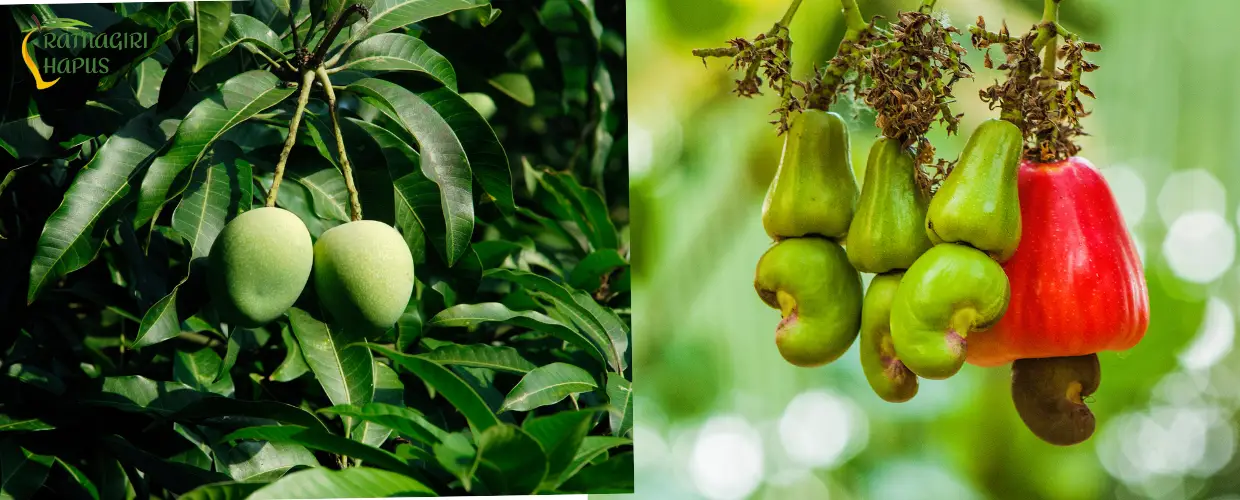
The region of Ratnagiri in Maharashtra, India, is famous for its premium-quality Alphonso mangoes and cashew nuts. But what sets these products apart isn’t just the taste; it’s the sustainable farming practices that ensure high-quality produce while protecting the environment and supporting local communities. Here’s a look at the key Sustainable Farming Practices in Ratnagiri involved in growing Alphonso mangoes and cashews in Ratnagiri.
In Ratnagiri, many farmers avoid harmful chemical pesticides and fertilizers, opting for organic farming methods instead. Organic farming ensures that the soil remains fertile and healthy, which contributes to better quality produce. By using natural compost, manure, and plant-based treatments, the farmers reduce the environmental footprint and keep the soil free of synthetic chemicals.
For Alphonso mangoes, natural pest control methods such as neem oil sprays are used to deter insects without harming the fruit or soil. Similarly, cashew trees are grown using organic fertilizers to promote robust tree growth and high-quality nuts without the risk of chemical contamination.
Ratnagiri’s coastal region benefits from heavy monsoon rains, which the farmers effectively harness through rainwater harvesting techniques. This ensures that water is stored and available throughout the dry months, minimizing the need for excessive groundwater extraction. Sustainable irrigation methods such as drip irrigation are also widely practiced. Drip irrigation allows precise water delivery to the mango and cashew trees, reducing water waste while ensuring that the crops get the hydration they need.
This approach is particularly crucial for the Alphonso mangoes, which are sensitive to water availability during critical growth stages. Controlled irrigation prevents the mangoes from being overwatered, which can affect the fruit’s flavor and texture.
Maintaining healthy soil is at the heart of sustainable farming in Ratnagiri. Agroforestry, the practice of integrating trees with crops, helps improve soil fertility and reduce erosion. For instance, cashew and mango trees are often grown alongside other native plants, which enhance the biodiversity of the region. This reduces the need for artificial fertilizers, as these plants naturally improve soil nutrients through processes like nitrogen fixation.
Additionally, the use of mulching—covering the soil with organic material like leaves and plant matter—helps retain moisture and keeps the soil temperature balanced. This not only supports the growth of healthier Alphonso mangoes and cashews but also reduces the need for irrigation.
Farmers in Ratnagiri are adopting methods to minimize the carbon footprint of their operations. By utilizing solar-powered equipment, reducing fuel consumption, and implementing efficient logistics, the entire supply chain becomes more environmentally friendly. Additionally, local sourcing of farming inputs reduces transportation emissions, making the entire process more sustainable.
The Alphonso mangoes and cashews are typically processed and packed near the farms to reduce transportation distances and preserve freshness. By processing cashew nuts locally, Ratnagiri farmers also reduce the environmental impact associated with shipping raw materials long distances for processing.
Sustainable farming in Ratnagiri goes hand-in-hand with promoting biodiversity. Mango orchards and cashew plantations are often intercropped with other fruit-bearing trees and native plants, which encourages a more diverse ecosystem. This practice not only supports wildlife but also improves the quality of the soil and helps control pests naturally.
For example, intercropping mango and cashew trees with legumes and other cover crops helps prevent soil erosion and enhances soil fertility, promoting healthier trees and better-quality produce.
Sustainability in Ratnagiri also includes a focus on the local farming communities. Many farms are run by smallholder farmers who are committed to eco-friendly practices. These farmers rely on sustainable farming to ensure long-term productivity while protecting their land for future generations.
By purchasing fair-trade and organic-certified Ratnagiri Alphonso mangoes and cashews, consumers directly support these farmers and their sustainable livelihoods.
Sustainability is at the heart of the farming practices in Ratnagiri. Through organic farming, water conservation, biodiversity promotion, and eco-friendly processing methods, farmers ensure that their Alphonso mangoes and cashew nuts are not only of the highest quality but are also grown in a way that protects the environment.
By choosing sustainable products like Ratnagiri Alphonso mangoes and cashews, consumers not only enjoy superior taste but also contribute to a farming system that nurtures the land and supports local communities.
Explore our range of sustainable Ratnagiri products and experience the quality and flavor that comes from responsible farming.